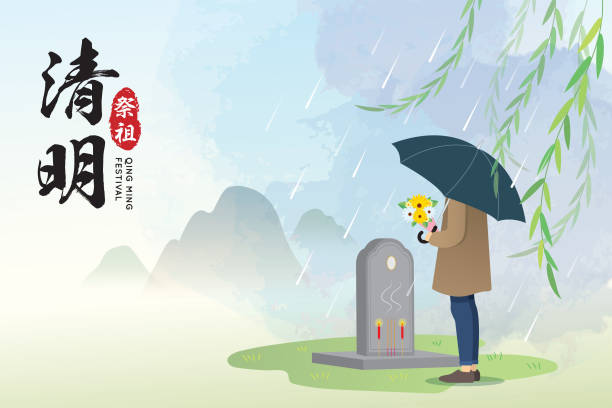The Qingming festival, also known as Tomb-Sweeping Day, is one of the four traditional festivals in China.
清明节,又称祭祖节等, 是中国四大传统节日之一。
The other three are Chinese New Year, Dragon Boat Festival, and Mid-Autumn Festival.
其它三个分别时春节、端午节和中秋节。
It falls on either Apr. 4, 5, or 6 each year. Chinese usually have a 3-day holiday.
每年的4月4日、5日或6日是清明节。中国人通常有3天的假期。
At the very beginning, Qingming was not a festival but the fifth of the 24 solar terms.
最开始,清明并不是一个节日,而是24个节气中的一个节气,排名第五。
The temperature rises after Qingming. It is the right time for spring plowing and sowing.
清明过后,气温上升,正是春耕和播种的好时候。
Later, the day becomes more of a festival for Chinese people to commemorate their ancestors.
后来,清明就不仅仅是一个节气了,而是成为人们纪念先祖的节日。
Tomb Sweeping Day began around the Zhou Dynasty, and it has a history of over 2,500 years.
清明节大约始于周朝,有2500多年的历史。
It originated from ancestral beliefs and spring rituals in ancient times.
其源自上古时代的祖先信仰与春祭礼俗。
The development of it has incorporated two other traditional festivals.
清明节融汇了另外两个传统节日的习俗。
The first is the Shangsi Festival which falls on the 3rd day of the 3rd lunar month, which is close to the Qingming Festival.
第一个是上巳节,时间是农历三月初三,时间上比较临近清明节。
The main customs of Shangsi Festival were spring outings, bathing in the river to get rid of bad luck and illness.
上巳节的主要习俗是春游、祓禊(指在河里洗澡以祛除厄运和疾病。
The second is the Cold Food Festival which is 1 or 2 days before the Qingming Festival.
第二个是寒食节,是在清明节前一两天。
People were not allowed to use fire and only ate cold food.
寒食节期间,人们不允许用火,只能吃冷食。
It's also a time for people to worship their ancestors.
人们也在这段时间祭祖。

According to the Book of the Later Han, the initial Cold Food Festival has lasted from nearly a month of minimum to 105 days of maximum.
据《后汉书》记载,最初的寒食节时间很长,最长的105天,最短的也要近1个月。
It's really a long time that not good for people's health and production.
由于时间过长,所以对人们的健康和生产不利。
In the Tang Dynasty, Cold Food Festival became only three days. Tomb-sweeping became popular at that time.
到了唐代,寒食节就变成只有三天。而也就是在唐代,上墓祭扫成为了风气。
Meanwhile, people usually went on a spring outing after tomb-sweeping.
同时,人们也开始在扫墓之后踏青郊游。
Later, there were more and more activities, such as kite flying, swinging, and Cuju playing, the ancient Chinese football.
后来,活动越来越多,如放风筝、荡秋千、踢蹴鞠(中国古代的足球)。
In the Song and Yuan dynasties, the Qingming Festival took the place of the Cold Food Festival, and the Shangsi Festival disappeared in northern China.
到了宋朝和元朝,清明节取代了寒食节,而上巳节也在中国北方消失了。
The main customs of the Qingming Festival are tomb sweeping and spring outing.
清明节的主要活动就是扫墓和春游。
In 2008, Qingming Festival officially became a public holiday with 1 day off.
2008年,清明节正式成为法定节假日,放假一天。
Since 2009, Chinese people have had a 3-day Qingming Festival holiday, including 1-day public holiday and 2 weekend make-up days.
2009年,中国公民在清明节可以享受3天的假期,包括1天的法定节假日和2天的周末补假。
There is a story about the origin of the Qingming Festival and the Cold Food Festival, which commemorated Jie Zitui, a loyal man in the Spring and Autumn Period.
关于清明节和寒食节的起源,有一个故事,是为了纪念春秋时期的忠臣介子推。
Jie Zitui cut a piece of meat from his thigh to save his lord Duke Wen of Jin during their exile but didn't want to get any reward like others.
在晋文公流放期间,随臣介子推为了救他,从自己的大腿上割下一块肉给他吃,后来,介子推也不想像其他人一样去讨赏。
In honor of Jie Zitui, the Duke decreed the day of his death as the "Cold Food Festival" and one day later as the Qingming Festival.
为了纪念他,晋文公把介子推死的那天定为“寒食节”,死后的第一天定为清明节。


